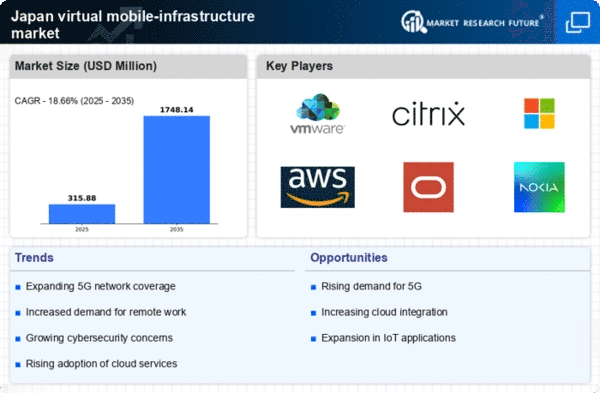Rising Demand for Remote Work Solutions
The virtual mobile-infrastructure market in Japan is experiencing a notable surge in demand for remote work solutions. As organizations increasingly adopt flexible work arrangements, the need for robust mobile infrastructure becomes paramount. This shift is reflected in a reported 30% increase in investments in mobile technologies over the past year. Companies are seeking to enhance productivity and collaboration among remote teams, which necessitates the deployment of advanced virtual mobile infrastructures. This trend is likely to continue as businesses recognize the long-term benefits of remote work capabilities, thereby driving growth in the virtual mobile-infrastructure market.
Increased Focus on Data Privacy Regulations
The virtual mobile-infrastructure market in Japan is being shaped by an increased focus on data privacy regulations. With the implementation of stricter data protection laws, businesses are compelled to invest in secure mobile infrastructures that comply with these regulations. This trend is underscored by a survey indicating that 70% of companies prioritize data security in their mobile strategies. As organizations strive to protect sensitive information, the demand for advanced virtual mobile infrastructures that ensure compliance is likely to rise, thereby driving market growth.
Technological Advancements in Mobile Connectivity
Technological advancements in mobile connectivity are playing a crucial role in the evolution of the virtual mobile-infrastructure market in Japan. The rollout of 5G technology is enhancing mobile network capabilities, enabling faster and more reliable connections. This improvement is expected to boost the performance of virtual mobile infrastructures, making them more appealing to businesses. As companies seek to leverage these advancements to improve operational efficiency, the virtual mobile-infrastructure market is likely to witness increased adoption and investment in innovative solutions.
Growing Importance of Business Continuity Planning
The virtual mobile-infrastructure market in Japan is increasingly influenced by the growing importance of business continuity planning. Organizations are recognizing the need for resilient mobile infrastructures that can withstand disruptions and ensure operational continuity. This awareness has led to a reported 25% increase in investments in mobile infrastructure solutions over the past year. As businesses prioritize risk management and continuity strategies, the demand for robust virtual mobile infrastructures is expected to rise, further propelling the growth of the market.
Government Initiatives Supporting Digital Transformation
In Japan, government initiatives aimed at promoting digital transformation are significantly influencing the virtual mobile-infrastructure market. The government has allocated substantial funding, approximately $1 billion, to support the development of digital infrastructure across various sectors. This investment is expected to enhance connectivity and accessibility, facilitating the adoption of virtual mobile solutions. Furthermore, policies encouraging innovation and technology adoption are likely to create a favorable environment for businesses to invest in mobile infrastructure, thereby propelling the growth of the virtual mobile-infrastructure market.
















